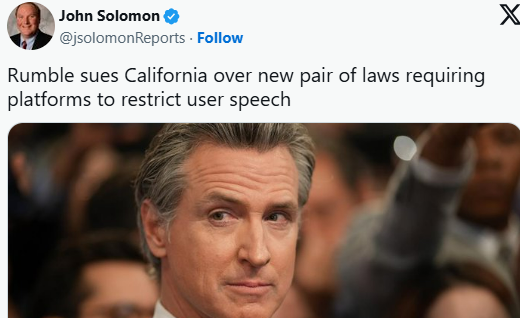Listen to the convo on Rumble suing California….
BREAKING: Rumble just filed a lawsuit against Gavin Newsom to overturn the law he signed that forces social media platforms to restrict free speech. Rumble wants the judge to issue an injunction permanently blocking the law. “The very thought of the government judging the content of political speech and then deciding whether it should be permitted, censored, or eliminated altogether is about the most chilling thing you could imagine. Rumble will always celebrate freedom and support creative independence, so we’re delighted to work with ADF to help protect lawful online expression.” – CEO @chrispavlovski Rumble’s lawsuit will help users speak freely on every social media platform, which basically means Chris is spending his own money to help protect speech for Americans in California. VERY AWESOME! – George (Tweet)
BREAKING: Social media platform Rumble is suing California for ‘Censorship’ restricting user speech.
‘We can’t trust the government to decide what is true in our online political debates’ 📣 pic.twitter.com/o7tAPCGB3T
— TWAUORG (@twauorg) November 28, 2024
Briefing Doc: Rumble vs. California – The Battle Over Online Political Speech
Central Issue: Video platform Rumble is suing California over two recently passed laws, AB 2655 and AB 2839, arguing they violate the First Amendment by compelling the platform to censor political content and act as an arbiter of truth.
Rumble’s Argument:
- Censorship: Rumble claims the laws amount to censorship, forcing them to restrict users’ speech and alter their own content to comply with the government’s view of what is acceptable political discourse. They argue this is a dangerous precedent, as stated by ADF Senior Counsel Phil Sechler: “We can’t trust the government to decide what is true in our online political debates.”
- Vague Standards: Rumble contends that the laws employ vague language, leaving them open to interpretation and abuse. Specifically, they point to phrases like content “reasonably likely to harm the reputation or electoral prospects” of candidates or “reasonably likely to falsely undermine confidence” in an election as overly broad and subjective.
- Operational Burdens: The platform argues that complying with the laws would require them to monitor and evaluate a massive amount of content, creating an undue burden and potentially stifling free speech by discouraging users from posting for fear of censorship.
Rumble sues California over new pair of laws requiring platforms to restrict user speech https://t.co/qsV6obViUT
— John Solomon (@jsolomonReports) November 28, 2024
California’s Position:
- Combating Misinformation: The state defends the laws as necessary to combat the spread of manipulated media, particularly deepfakes, which they argue can undermine democratic processes by misleading voters.
- Public Trust in Elections: California officials, including Governor Gavin Newsom, emphasize the importance of maintaining public trust in elections and ensuring voters have access to accurate information. They believe these laws are essential to safeguarding the integrity of the electoral process.
Key Background & Context:
- Motivation for the Laws: Rumble and ADF point out that these laws were introduced following Newsom’s criticism of a parody video of then-presidential candidate Kamala Harris, and the White House’s dismissal of videos depicting President Biden in an unflattering light as “cheap fakes.” This raises concerns that the laws are politically motivated and designed to silence dissenting voices.
- Babylon Bee Precedent: ADF successfully represented the Babylon Bee in a similar lawsuit against California over AB 2839. The state ultimately backed down after a federal court found the law likely violated the First Amendment. This case provides a potential legal precedent for Rumble’s lawsuit.
Potential Implications:
- Free Speech vs. Regulation: This case highlights the ongoing tension between protecting free speech and regulating online content to prevent the spread of misinformation. The outcome could have a significant impact on how online platforms moderate content and the extent to which governments can regulate online speech.
- Impact on Online Platforms: If California prevails, it could lead to increased responsibility for online platforms to monitor and regulate user-generated content, potentially leading to more restrictive content moderation practices across the industry.
Quotes of Note:
- “California’s war against political speech is censorship, plain and simple.” – ADF Senior Counsel Phil Sechler
- “The very thought of the government judging the content of political speech, and then deciding whether it should be permitted, censored, or eliminated altogether is about the most chilling thing you could imagine.” – Rumble CEO Chris Pavlovski
- “Manipulating a voice in an ‘ad’ like this one should be illegal.” – California Governor Gavin Newsom
This case presents a complex legal battle with potentially far-reaching consequences for online speech and the role of platforms in moderating content. It remains to be seen how the courts will ultimately rule on the constitutionality of California’s laws and the balance between free speech and government regulation of online platforms.









Add comment